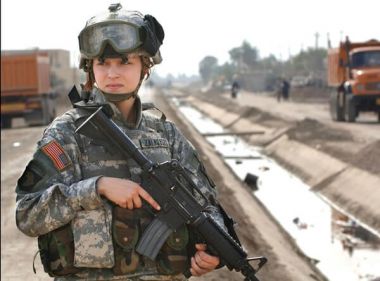Iraqis believe U.S. is actually supporting ISIS; American military officials admit perception is real but untrue

Although the United States is ostensibly leading a coalition of nations in the fight against the Islamic State (ISIS), many Iraqis believe that the U.S. is actually supporting the globally despised terrorist and jihadist organisation, the Washington Post reported.
Some Iraqi soldiers claimed they had seen videos purportedly showing U.S. helicopters airdropping weapons to ISIS militants. They also alleged that their friends and relatives had seen similar instances of collusion, the Post report said.
Ordinary Iraqis on the streets said they have also seen the videos, heard the stories and are convinced that the U.S. is supporting ISIS as part of its alleged plan to assert control over Iraq, the rest of the Middle East and the region's oil.
"It is not in doubt," said Mustafa Saadi, who said his friend saw U.S. helicopters delivering bottled water to ISIS positions. Saadi is a commander of a Shiite militia that last month helped push the militants out of the oil refinery near Baiji in northern Iraq alongside the Iraqi army.
The Islamic State is "almost finished," he said. "They are weak. If only America would stop supporting them, we could defeat them in days."
U.S. military officials say the accusations are too outrageous to merit a response but admit that the perception is real. "It's beyond ridiculous," said Col. Steve Warren, the military's Baghdad-based spokesman. "There's clearly no one in the West who buys it, but unfortunately, this is something that a segment of the Iraqi population believes."
This perception among a "segment of the Iraqi population" appears to be widespread, the Post report said, adding that Iraqis still could not trust the Americans since U.S. forces invaded their country in 2003.
The distrust appears to extend up to the highest level of government in Baghdad. For instance, Iraqi Prime Minister Haidar al-Abadi expressed disagreement when U.S. Defense Secretary Ashton B. Carter announced on Tuesday that an expeditionary force of U.S. troops will be dispatched to Iraq to conduct raids, free hostages and capture ISIS leaders.
"There is no need for foreign ground combat troops," Abadi said in a statement. "Any such support and special operations anywhere in Iraq can only be deployed subject to the approval of the Iraqi Government and in coordination with the Iraqi forces and with full respect to Iraqi sovereignty."
It remains uncertain on whether the Obama administration would push through its plan to send combat ground troops despite the Iraqi president's opposition.
The allegations of U.S. collusion with the ISIS are often mentioned in discussions among Shiite politicians in parliament. They are also highlighted in postings on social media.
U.S. officials believe this is the handiwork of Iran whose allies in Baghdad appear to be the ones leading the campaign to erode American influence in Iraq.
In one recent video that appeared on the Facebook page of a Shiite militia, a lawmaker with the country's biggest militia group, the Badr Organisation, waves apparently new U.S military MREs (meals ready to eat) — one of them chicken and dumplings — allegedly found at a recently captured ISIS base in Baiji, which, he said, is proof of U.S. support to ISIS.
"The Iranians and the Iranian-backed Shiite militias are really pushing this line of propaganda, that the United States is supporting ISIL," Warren said. "It's part of the Iranian propaganda machine."
However, in Iraq's semiautonomous region of Kurdistan, support for the United States remains strong, and its leader has said it would welcome more troops











